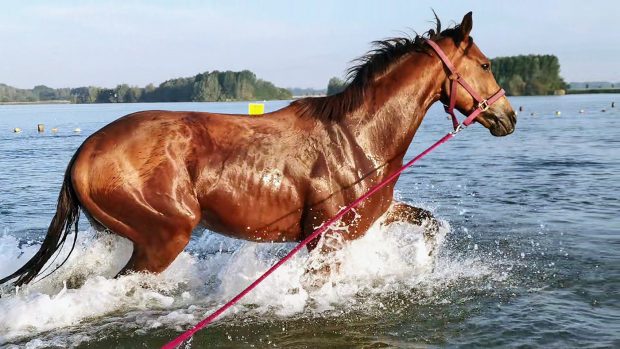Many experienced owners are aware of the benefits swimming can provide to their horses’ health and wellbeing, so already know the answer to “can horses swim?” is most certainly yes. Horses have a natural instinct to swim when in deep water and equine swimming pools can be a useful tool for improving fitness or for rehabilitation following some injuries.
Can horses swim?
Horses swim similarly to dogs in that they make a paddle-like motions with their legs. Having large lungs also contributes to keeping horses afloat while they swim.
The majority of horses enjoy the water and will naturally swim when they move out of their depth. But some may initially be wary of the water and so they will need time to build up their confidence.
The benefits of swimming horses
There are both physical and physiological benefits of swimming for horses. These include:
- Fitness – A horse has to work hard when swimming, so it’s excellent for increasing the capacity of their heart and lungs as well as toning muscles
- Rehabilitation – Hydrotherapy is popular for those horses recovering from leg and tendon injuries, as well as muscle damage
- Entertainment – Many horses enjoy swimming, much like many humans do.

Because horses cannot hold their breath in the same way we can, if their head becomes submerged there is a greater danger of drowning. Also try to keep water out of a horse’s ear as it could cause discomfort or even lead to an ear infection.
“Swimming isn’t for every horse,” says Moulton College’s former equine centre manager Pippa Hatten. “They have to enjoy the actual technique of swimming and they have to want to go through the water in order for it to be of real benefit.
“The swimming programme is designed to give strength for endurance and stamina. Because of the horse being buoyant, you’re taking out the concussive force on the legs that roadwork and galloping will always bring to the table,” adds Pippa.
“When there’s hard ground, people are always looking for other ways to get their horses fit. Swimming has been used for years and years in racing and now it’s getting more and more popular for sport horses too.”
NB: The above video is archive footage recorded in 2015
How do horses swim?
The size of a horse’s lungs aids their competency to swim. One horse lung can hold 14.5 gallons (55L) of air, and these act as a floatation device to keep the horse from sinking.
They also have long, strong legs, which means that when they kick in the water, they efficiently propel themselves along.
When a horse swims, the only part of the horse you’ll see is the horse’s head. In deep water, the horse’s body will be completely underwater while its head sits right on top of the surface so the horse can continue to breathe and see and be alert.
Continued below…

Subscribe to Horse & Hound this spring for great savings
How long can horses swim for?
Swimming is hard work for horses and it will quickly tire them out. Horses that have swimming included as part of their competition fitness regimes, will only need to be in the pool for a few minutes at a time. The time a horse is able to swim depends on the horse and how in-shape and capable in the water they are.
Horses can swim for between five and 10 minutes per session. It’s important to be aware of your horse’s behaviour to gauge when they are starting to tire. Swimming is strenuous for horses; a three minute swim can be the equivalent of a three mile gallop on land.
Be aware that swimming isn’t appropriate for all horses and you should do your research into whether it is suitable for your horse before taking the plunge. For example swimming is not typically recommended for horses with some back problems or those lacking topline as these horses tend to invert their body shape even more when they are in the water, which is counter-productive to helping to build stronger core muscles and topline.
How fast can horses swim?
When it comes to speed, a horse is nowhere near as quick in the water as on land, reaching a maximum swimming speed of about 4km/hour.
Is there a difference between swimming a horse in fresh water and salt water?
Salt water provides more buoyancy than fresh water because of the higher density of salt water. You may therefore notice that you can swim faster through salt water, compared to fresh water. This is because buoyancy allows you to float higher in the water. However, there are other factors to take into consideration, such as depth and current.
Would you like to read Horse & Hound’s independent journalism without any adverts? Join Horse & Hound Plus today and you can read all articles on HorseandHound.co.uk completely ad-free




